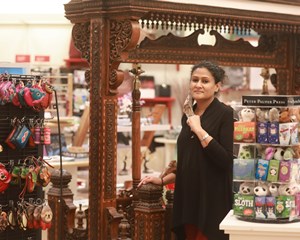But for some store owners, particularly in hotspot cities, creative in-person solutions are less feasible. In July, Onikah Asamoa-Caesar opened Fulton Street Books & Coffee, the only Blackowned bookstore in Tulsa, Okla. Since then, she has offered limited socially distanced shopping at her store. She's opting out of participating in holiday fairs and markets this year for safety reasons; after giving birth to her daughter in April, AsamoaCaesar has felt the need to be especially careful.
然而,面對面的創(chuàng)意解決方案對于一些尤其是在熱點城市的店主來說不太可行。7月,奧尼卡·阿薩莫阿-凱撒開了一家富爾頓街書店和咖啡店,這是俄克拉荷馬州塔爾薩市的唯一一家黑人書店。之后,她在店里提供了有限的社交距離購物服務(wù)。今年出于安全考慮,她選擇不參加禮品展和集市。阿薩莫阿-凱撒在4月份生下女兒后,覺得還是小心為妙。
"I've said no to so many things that I would love to do, but unfortunately for us, it's really not safe," Asamoa-Caesar said. "I don't want to add to our numbers in any way, I don't want to put myself in a situation that might not be safe, and I don't want to endanger my team members. We're really trying to drive people to our website to do their holiday shopping."
阿薩莫阿-凱撒說:“我已經(jīng)拒絕了很多我想做但對我們來說很不幸的事情,真的不安全。我不想增加我們國家的感染人數(shù),我不想讓自己處在有潛在危險的環(huán)境下,我也不想讓我的團(tuán)隊成員遭遇危險。我們真的在努力吸引人們到我們的網(wǎng)站進(jìn)行假日購物。”
Jenny DaSilva, the founder and director of Start Small Think Big, a nonprofit that helps underresourced small-business owners, believes that it's up to consumers to support small businesses during this time. "These are businesses that typically have less than one month's worth of cash cushion on hand, and they've been doing this for nine months," DaSilva said. "Every day that goes by puts them closer to the brink. I think it is the responsibility of the consumer to meet those businesses."
“小起點,大腦洞”是一家為資源不足的小企業(yè)主服務(wù)的非營利組織,珍妮·達(dá)席爾瓦是其創(chuàng)始人和董事,她認(rèn)為這段時間里應(yīng)該由消費(fèi)者來支持小企業(yè)。達(dá)席爾瓦說:“這些企業(yè)手頭儲備的現(xiàn)金通常不足一個月,而這種情況已經(jīng)持續(xù)了9個月。時間一天天過去,他們離死亡越來越近。我認(rèn)為滿足這些企業(yè)的需求是消費(fèi)者的責(zé)任。”

The Cohens of Economy Candy have found that kind of support from their community. On the weekends, in an attempt at some kind of normality, they take orders by hand from longtime local customers who line up 6 ft. apart outside the store. But the majority of their revenue now comes from online orders, which were once just 10% of their total sales. And those sales are a fraction of what the store would normally do this time of year. "We rely on the holiday time: Thanksgiving, Christmas, Hanukkah, the general holiday spirit, businesses having their holiday and year-end parties," Mitchell Cohen said. "We lost tourism, we lost parties, we lost events. We lost 75% of our business."
經(jīng)濟(jì)糖果店的科恩一家在他們所在的社區(qū)找到了這種支持。為了恢復(fù)正常,周末的時候他們會親自接受在店外6英尺(約1.8米)外排隊等待的本地老顧客的訂單,不過現(xiàn)在他們大部分的收入都來自于曾經(jīng)只占他們總銷售額10%的線上訂單,而這些銷售額只是該店每年這個時候正常銷售額的一小部分。米切爾·科恩說:“我們的收入依靠節(jié)日:感恩節(jié)、圣誕節(jié)、光明節(jié)、平日的節(jié)日氛圍、企業(yè)的節(jié)日和年終聚會。我們失去了旅游,失去了派對,失去了活動。我們丟掉了75%的業(yè)務(wù)。”
It's a challenge unlike anything else the store has experienced over the nine decades it's been in business, during which it has survived the Great Depression, 9/11 and Hurricane Sandy. But the Cohens remain hopeful that their pivot to online sales can save them this holiday season. They've begun making candy care packages in Thanksgiving, Christmas, Hanukkah and nondenominational themes that encourage customers to celebrate the season with loved ones, even if they have to do so from afar.
這家店在經(jīng)營的90年里經(jīng)歷了大蕭條、9/11和桑迪颶風(fēng),這是一次前所未有的挑戰(zhàn)。但科恩夫婦仍希望他們轉(zhuǎn)向線上銷售能夠在這個假日季拯救自己。他們已經(jīng)開始在感恩節(jié)、圣誕節(jié)、光明節(jié)和無教派主題的時候制作糖果關(guān)懷包,鼓勵顧客和愛的人一起慶祝這些節(jié)假日,即便彼此遙遙相隔。
"We got by the first 80 years by people telling their friends and people from out of town to go shop at Economy Candy; now, word of mouth is online and on social media," Mitchell Cohen said. "We need people to shop local and shop mom-and-pops so we can be here for another 80 years."
米切爾·科恩說:“最初的80年里會有朋友介紹而來或者從外地過來的人到經(jīng)濟(jì)糖果店購物,現(xiàn)在我們依靠的則是線上和社交媒體上的口碑。我們需要人們在當(dāng)?shù)刭徫铩⒃诜蚱薜曩徫铮@樣我們才能在這里再生存80年。”
譯文由可可原創(chuàng),僅供學(xué)習(xí)交流使用,未經(jīng)許可請勿轉(zhuǎn)載。











